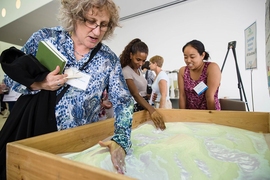This set of FAQs accompanies the Feb. 2, 2016, announcement of MIT’s plans to consolidate and expand the Institute’s programs in online and digital education.
What is the news?
MIT President L. Rafael Reif announced today a series of new Institute-wide initiatives aimed at consolidating and significantly expanding the Institute’s programs in online and digital education — which span from pre-kindergarten through graduate and professional education.
What are these initiatives?
MIT announced several Institute-wide initiatives aimed at coordinating and expanding the Institute’s programs in residential and digital education, at all levels of teaching and learning. At the core, the Integrated Learning Initiative (MITili, or “mightily”) will bring focused, rigorous quantitative and qualitative research to bear on the process of learning.
The investigative work of MITili will shape the directions of MIT’s efforts in three key areas: pK-12, higher education, and professional continuing education. The pK-12 Action Group will coordinate the more than 100 existing programs at MIT serving pK-12 education. In higher education, MIT will expand its digital learning offerings on MITx and OpenCourseWare, while reimagining the MIT undergraduate experience through Residential MITx and the MITx Digital Learning Lab, two programs that support faculty use of digital tools on campus. In the realm of continuing education, MIT will provide scalable learning solutions for corporations, executives, and professionals.
Why is MIT announcing this now?
In summer 2014, the Institute-Wide Task Force on the Future of MIT Education, commissioned by President Reif, issued its final report. To promote rigorous, data-driven educational experimentation, assessment, and research, the Task Force report proposed that MIT create a faculty-led initiative for educational innovation; establish a hub for learning research, practice, and outreach; define a pK-12 strategy; expand continuing and professional education offerings; and engage the MIT community with the world.
The Integrated Learning Initiative responds to this challenge by addressing our fundamental understanding of learning and teaching. MITili, pK-12, and MIT’s digital learning efforts implement several recommendations made by the Task Force to shape the future of education at MIT and beyond, through bold experimentation in learning research, practice, and design.
Who will lead these initiatives?
In keeping with the high priority of these new efforts and of the entire field of digital learning, Professor Sanjay Sarma will take on the newly created position of vice president for open learning, reporting directly to President Reif. Sarma, currently MIT’s dean of digital learning, is also the Fred Fort Flowers (1941) and Daniel Fort Flowers (1941) Professor of Mechanical Engineering.
How are other MIT departments, labs, and centers involved?
MITili, the pK-12 Action Group, and MIT’s ongoing open education and digital learning programs are cross-disciplinary, Institute-wide initiatives working closely with Chancellor Cynthia Barnhart, the Office of the Dean for Undergraduate Education, and the Office of the Dean for Graduate Education, under the charge of President Reif. These initiatives will serve as incubators for collaborations between MIT departments, labs, and centers as well as outside industries, governments, and universities.
What is MITili?
The MIT Integrated Learning Initiative is a multidisciplinary center for research in teaching and learning. It will drive fundamental research on learning to improve approaches to teaching and educational technologies on campus and online. MITili will draw from fields as wide-ranging as cognitive psychology, engineering, neuroscience, economics, health, arts, design, and architecture.
What is the purpose of MITili?
The goal of this research is to study the acquisition, retention, mastery, integration, transfer, and practice of knowledge; understand the social, political, and economic ecosystem of education; and use these findings to build next-generation learning systems to transform education at all levels: pK-12, higher, and professional.
Who will lead MITili?
John Gabrieli, the Grover Hermann Professor in Health Sciences and Technology in MIT’s Department of Brain and Cognitive Sciences, director of the Martinos Imaging Center, and a member of the McGovern Institute, will serve as the director of MITili. Sanjay Sarma, the Fred Fort Flowers (1941) and Daniel Fort Flowers (1941) Professor of Mechanical Engineering, will guide MITili as vice president for open learning.
What is the governance structure of MITili?
MITili will be guided by a faculty advisory committee that will work closely with the deans for undergraduate education and graduate education, and collaborate with faculty, students, and staff across the five schools at MIT.
When will MITili be launched?
Immediately. As of this announcement, the MIT Integrated Learning Initiative will begin formal activities. MITili will work alongside a number of existing institutional efforts and research programs on campus.
How will this research be shared?
The research of MITili’s faculty, postdocs, students, and associated scholars will be published and made available to the community. The Integrated Learning Initiative will also host research symposia, talks, and other events open to the community.
How will MITili impact MIT’s residential education?
MITili will inform MIT’s activities in education. These activities will be coordinated with MIT’s Office of the Dean of Undergraduate Education, the Office of the Dean of Graduate Education, and the academic departments of MIT. The Dean for the Undergraduate Education is seeking ambitious proposals that reimagine linkages between undergraduate education and the student experience at MIT.
How will MITili affect MIT’s on-campus teaching?
In consultation with the Teaching and Learning Laboratory, Scheller Teacher Education Program, Teaching Systems Lab, and other efforts on campus, MITili will aid in advancing new teaching pedagogies and methodologies to further enhance the experience of MIT’s undergraduate and graduate students in the classroom, laboratory, and online, while providing space for faculty to test new directions in course design and pedagogy.
How can MITili address the disciplinary divides in education?
At its core, the Integrated Learning Initiative seeks to integrate approaches to teaching and learning across the disciplines, bringing together the best learning research in fields as wide-ranging as physics, neuroscience, and the humanities. To coalesce this research, MITili will foster interdisciplinary connections across the Institute through collaborative research, teaching, and outreach.
How will MIT weigh in on educational outcome measurements?
Assessment is central to our modern educational system, yet substantial research on the effectiveness of many assessment programs is lacking. By researching assessment outcomes at all levels of education, MIT hopes to help guide future assessment policy and practice.
What is the pK-12 Action Group?
The new pK-12 Action Group will bring MIT’s unique learning approach beyond the campus to pK-12 learners and teachers around the world, building upon existing efforts and developing new ones. The initiative will contribute to a growing need in STEM education by initiating new research, design, and outreach programs that will transform how students learn — and our understanding of how they learn. It will engage MIT faculty, staff, students, and researchers in pursuing two major, interrelated goals: changing the world through learning, and changing the world of learning.
What is the MITx Digital Learning Lab?
The MITx Digital Learning Lab is a cohort of researchers who play a central role in applying the latest science of learning to advance digital teaching strategies, technologies, and content. These postdocs and graduate students serve as digital learning ambassadors in their departments, collaborating directly with faculty and guiding departments on digital learning strategies.
How will MITili affect MIT’s existing open-education initiatives, MIT OpenCourseWare and MITx?
Research out of MITili will inform MIT’s digital learning and open education efforts, such as MIT OpenCourseWare, MITx, and the new MicroMaster’s program, and seeks to further improve these online learning platforms by applying latest developments in learning scholarship and educational technology.












